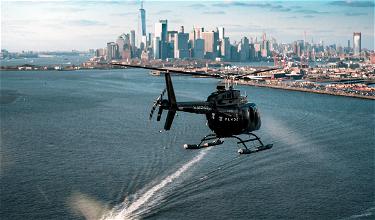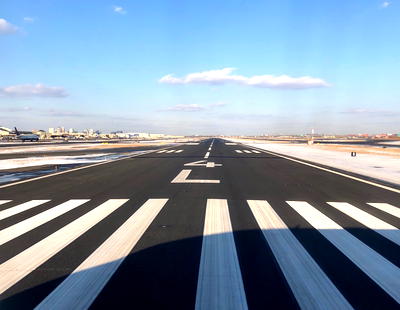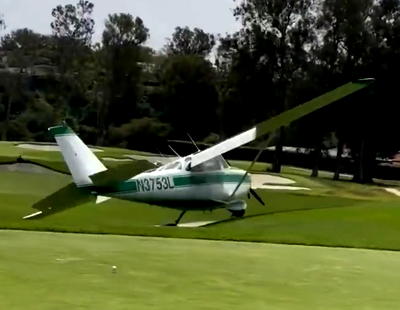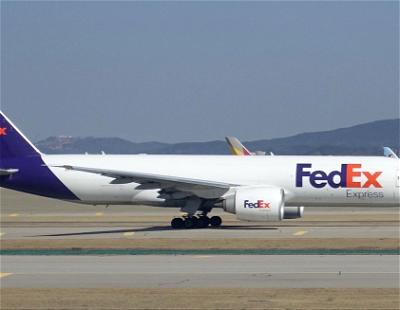I’ve written quite a bit about BLADE lately. They’re the company that offers helicopter services to & from New York, and recently they’ve been in the news for their service expansion.
BLADE is now offering $195 one-way transfers from Manhattan to JFK, LGA, and EWR, and they’re hoping to lower the prices even more in the future.
They’re quickly getting to the point where they can compete with an SUV service in terms of cost, and with helicopter rides taking just five minutes, the time savings can be huge.
One of the key things to understand is that BLADE doesn’t actually operate their own airplanes and helicopters. Instead they’re really a tech company, just like Uber is, and they contract out to other companies to do the flying. They just do the marketing and make the booking process easy.
BLADE helicopter crashes in the Hudson
Yesterday afternoon a helicopter operated by Zip Aviation crashed into the Hudson. Only the pilot was onboard, and fortunately he made it out without life-threatening injuries.
The helicopter wasn’t operating a flight on behalf of BLADE, but rather was being repositioned for refueling (but this was after operating BLADE flights).
Here’s how a BLADE spokesperson describes the incident:
“Earlier today, a helicopter made a safe emergency landing on floats in the Hudson River near the heliport. The pilot was not injured and immediately exited the aircraft.”
It hasn’t been released what exactly happened, though there is video footage of the incident:
Terrifying video shows a helicopter spiraling out of control before crashing into the Hudson River. Thankfully, the pilot survived. https://t.co/UOejG4cI80 pic.twitter.com/PyJ0zZ1mDy
— Eyewitness News (@ABC7NY) May 15, 2019
I’m terrified of helicopters
Before I share my further opinions, let me say that I’m terrified of helicopters. I know that might seem backwards given that I’m not scared of airplanes, but there’s something about the science of helicopters that just confuses me (full disclosure: I’m really bad at science, and it was my worst subject in school).
If a plane’s engines stop, it can glide a bit. If a helicopter’s engine stops, it suddenly becomes a rock. At least that’s my understanding.
I’m not suggesting helicopters are dangerous, or that you shouldn’t fly them. Rather I’m just suggesting that they scare me, along with chairlifts, spiders, and the snack mix in Admirals Clubs.
My concerns…
This isn’t necessarily specific to this one scenario, but rather it’s a big picture concern I have with the direction so many “tech” companies are taking.
BLADE doesn’t operate helicopters themselves, but rather they’re a tech company. Fair enough. The issue is that on some level it creates a lack of transparency. When you book with BLADE, everything is BLADE branded — the booking experience, the lounge, and the helicopter.
The reality, though, is that you’re putting your life in the hands of a completely different company you know nothing about. Now, as a matter of good business we can hope that they’re safe and that BLADE is contracting out to good companies because their reputation relies on it.
It’s not that I expect BLADE to fully accept responsibility when things go wrong (at least not directly), but it seems they’re doing very little to acknowledge this happened, and are quick to point out that this was a Zip Aviation helicopter. For example, BLADE doesn’t even acknowledge that this happened on social media.
Bottom line
Thank goodness that there was only one person on the helicopter, and that they didn’t sustain life-threatening injuries. As someone who is scared of helicopters but who was considering this BLADE service for review purposes, this might have put me off doing so for a while.
I realize helicopters aren’t dangerous, but I do have an irrational fear, so…
As we increasingly see companies offering tech services and branding, I’m concerned about the lack of accountability when things go wrong. It’s no different than what we see with Uber, though I think most of us probably expect a slightly higher standard for helicopters than we do for cars.
Do you have any concerns about using companies like BLADE that contract out their flights to other companies you may not be familiar with, or no?





A colleague and I had been seriously considering taking Blade to EWR yesterday - the luggage policy was giving us pause.
And then this happened, and since we both have young kids, we decided that it wasn't worth it.
@Dan Nainan - do you mind showing us your stats about helos being safer than cars? The only "data" I can find suggests that helos are 85 times more dangerous...
Flew the very helicopter that went down just last month. (Certain I had a different pilot though.) If anything it comforts me to know these things have floats and other safety bits to protect passengers in this situation. I'll happily use Blade...er...Zip again.
You are terrified of helicopters? By that logic, you should never get into a car; they're statistically much more dangerous.
@Nate: Are you a troll (aka unpaid intern hoping to get a job) for TPG?
Some of us don’t read that pompous ass’ biased crap...
>The reality, though, is that you’re putting your life in the hands of a completely different company you know nothing about.
Exactly the same as most NYC taxicabs. The majority of cab drivers are independent contractors, not employees. If the cab crashes, you sue the driver, not a company. No different than Blade.
So much is wrong, but this article isn't news, it's entertainment opinion. It says so at the bottom of the page. I'm sorry I wasted my time.
What's with the weird flash/release near its skids around treeline level just before impact?
Too many helicopter crashes in the past year, no thanks I'll pass
Every charter service out there is regulated by Part 135, so it’s not like there’s anything shady going on back of the kitchen...
Late 1970 I flew Love Field to San Francisco and then took a twin rotor helicopter to Oakland . It was quick and probably cheaper than a taxi and way less complicated than taking buses .
Helicopters are mechanically complicated and you need to pay close attention to their condition .I like them anyway .
How do I know? I used to have a job with the government...
Helicopter and fixed wing pilot here that has flown a helicopter to the one in question.
I want to clarify helicopter engine failures - when a single engine helicopter's engine fails, it doesn't fall like a brick, a procedure where you reduce the pitch in the blades and keep the blades turning to, just before landing, turn that fast spinning blade into a parachute or air brake. The "flying characteristic of a brick" allegedly comes...
Helicopter and fixed wing pilot here that has flown a helicopter to the one in question.
I want to clarify helicopter engine failures - when a single engine helicopter's engine fails, it doesn't fall like a brick, a procedure where you reduce the pitch in the blades and keep the blades turning to, just before landing, turn that fast spinning blade into a parachute or air brake. The "flying characteristic of a brick" allegedly comes from the Navy/Marine Corps helicopter introduction course handbook, which is designed for new pilots who just completed some exposure to small fixed wing aircrafts, which, obviously, have completely different flying characteristics.
As for comments about helicopter pilots and their macabre sense of humor - rotary wing aviation is still relatively young; many of us were trained by Vietnam War veteran helicopters who were sent off to war with minimal training, got to war, and figured out how to deal with a slew of mechanical issues on the spot, many losing their lives; rotary wing aviation is also full of full of former military aviators, virtually all of whom have two degrees of separation from people that have been killed or injured flying helicopters under dangerous environmental conditions.
Did he run out of Jet-A?
Yeah...that’s obviously not a ‘controlled emergency landing’ as Blade would have you believe. You can clearly see that something happens to the tail rotor causing the pilot to lose control, at which point the helicopter goes down HARD into the water...
Likely cause:
In helicopters, loss of tail rotor effectiveness (LTE), or unanticipated yaw, is an uncommanded rapid yaw that does not subside of its own accord. LTE can occur in all single-engine, tail rotor-equipped helicopters at airspeeds lower than 30 knots and, if uncorrected, can cause the pilot to lose helicopter control, potentially resulting in serious injuries or death.
Various factors can contribute to LTE, including varying airflow from the main rotor blades...
Likely cause:
In helicopters, loss of tail rotor effectiveness (LTE), or unanticipated yaw, is an uncommanded rapid yaw that does not subside of its own accord. LTE can occur in all single-engine, tail rotor-equipped helicopters at airspeeds lower than 30 knots and, if uncorrected, can cause the pilot to lose helicopter control, potentially resulting in serious injuries or death.
Various factors can contribute to LTE, including varying airflow from the main rotor blades (particularly at high power settings) or from the environment, which can affect the airflow entering the tail rotor; operating at airspeeds below translational lift; operating at high altitudes and high gross weights; operating near large buildings or ridgelines, which can cause turbulence; and the relative wind direction.
Helicopter: a heap of spinning metal fatigue surrounded by an oil leak on the way to a crash site.
Definitely not the case that fixed wing training comes first. In fact, there are many "reflexes" that are the opposite in a helicopter vs fixed wing to the point that if you're going to learn both, you need to commit to really learning both because otherwise you might inherit some bad habits.
I've had a couple of sensational helicopter rides and was surprised just how smooth they are (haven't even felt the inertia on lift off). Additionally, I believe pilots have to go through fixed wing training before electing to go rotor (someone correct me if I'm mistaken - I heard this from a helicopter pilot).
So I have no dramas with them - crashes (like airlines) - always draw attention. To head to one of...
I've had a couple of sensational helicopter rides and was surprised just how smooth they are (haven't even felt the inertia on lift off). Additionally, I believe pilots have to go through fixed wing training before electing to go rotor (someone correct me if I'm mistaken - I heard this from a helicopter pilot).
So I have no dramas with them - crashes (like airlines) - always draw attention. To head to one of the NYC airports from Manhattan in 5 mins sounds VERY appealing.
One of my favorite comments: "a helicopter is just a collection of parts flying in formation." Other than that, fear is relative. Imagine taking a resident of, say, 1870s Dodge City on your daily car commute in the L. A. Area. Would he/she survive it without a heart attack? :) By the way, this type of Helicopter event does Make The News whenever it happens. I can think of a couple of Las Vegas examples...
One of my favorite comments: "a helicopter is just a collection of parts flying in formation." Other than that, fear is relative. Imagine taking a resident of, say, 1870s Dodge City on your daily car commute in the L. A. Area. Would he/she survive it without a heart attack? :) By the way, this type of Helicopter event does Make The News whenever it happens. I can think of a couple of Las Vegas examples where (Grand Canyon sightseeing) helicopters went down and they had passengers on them. There were no survivors in at least one case.
@vbscript2 - You’re right! I totally screwed that up, bad memory. In the 20 years I spent in the Army, I flew on helicopters very frequently and never worried about hard landings on land. Over the water, I’d prefer to have Captain Sully and an Airbus!
I consider helicopters to be safe but slightly less safe. I have taken helicopters to airports. With Blade, I was thinking of using them but have decided to probably not use them. Rarely am I on so tight a schedule in NYC.
In terms of time savings, Blade is more efficient going to the airport. Coming from the airport, the arrival time of the main airline flight is variable.
@Donna
Your memory regarding glide ratios is very wrong. It sounds more like you're thinking of a jet fighter than a 737. Airliners (including the 737) have very good glide ratios, much better than any Cessna you'd have flown. Also, your Cessna almost certainly did not have a 17:1 glide ratio. More like 9:1 or maybe 10:1. The 737 is closer to double that figure.
Perhaps what you were remembering is 3 nmi per thousand...
@Donna
Your memory regarding glide ratios is very wrong. It sounds more like you're thinking of a jet fighter than a 737. Airliners (including the 737) have very good glide ratios, much better than any Cessna you'd have flown. Also, your Cessna almost certainly did not have a 17:1 glide ratio. More like 9:1 or maybe 10:1. The 737 is closer to double that figure.
Perhaps what you were remembering is 3 nmi per thousand feet? That's a pretty reasonable estimate, but an nmi is 6,076 ft, so that's a glide ratio of over 18:1. Of course, this will vary with weight and such.
Old news lucky. TPG got an article about it right away.
"If a plane’s engines stop, it can glide a bit. If a helicopter’s engine stops, it suddenly becomes a rock. At least that’s my understanding."
That's not completely true, but also not too far off.
First off, a plane can glide more than a bit if the engines stop. An airliner from cruise altitude can glide over 100 miles with no engine power. Essentially, aerodynamically, everything works exactly the same, with the obvious exception of...
"If a plane’s engines stop, it can glide a bit. If a helicopter’s engine stops, it suddenly becomes a rock. At least that’s my understanding."
That's not completely true, but also not too far off.
First off, a plane can glide more than a bit if the engines stop. An airliner from cruise altitude can glide over 100 miles with no engine power. Essentially, aerodynamically, everything works exactly the same, with the obvious exception of not being able to maintain altitude or climb without losing airspeed and, as a result, go-around isn't an option.
For helicopters, there's a technique called "autorotation." For the most part, the helicopter does indeed drop like a rock, but, since the pilot has control over the pitch of the blades (the angle at which the blades move through the air,) they can reverse it from normal where the air moving through the blades during the fall will keep the blades spinning. Then, as the helicopter nears the ground, it can switch the pitch back to normal and use the momentum of the rotor to slow the descent just before reaching the ground for a soft(er) landing. It's not nearly as safe as a gliding airplane (which is little different from a powered one, aside from the impossibility of go-around,) but it gives a decent chance of survival.
One of the key things to understand is that New Yorkers overwhelmingly demanded this heliport be shut down due to noise and other environmental issues yet it is still in operation. Perhaps a tragedy like this will finally get it shut down. These stupid helicopters create a huge and unnecessary environmental footprint and honestly you barely save any travel time from the far west side to JFK much of the day.
And blame the...
One of the key things to understand is that New Yorkers overwhelmingly demanded this heliport be shut down due to noise and other environmental issues yet it is still in operation. Perhaps a tragedy like this will finally get it shut down. These stupid helicopters create a huge and unnecessary environmental footprint and honestly you barely save any travel time from the far west side to JFK much of the day.
And blame the Manhattan traffic mess of the past five years on Uber as most professional analyses have done.
Helicopters don’t fly; they vibrate so bad that the earth rejects them!!
They successfully avoided the BLADE name being used in any of the national news broadcasts last night and this report of a “safe” emergency landing was another attempt to mitigate any fear on the part of the public. That pilot was lucky (excuse the bad inference) to escape with minor injuries. Spinning blades hitting the water is not a “safe” emergency landing. The pilot did a good job but I would not have wanted to...
They successfully avoided the BLADE name being used in any of the national news broadcasts last night and this report of a “safe” emergency landing was another attempt to mitigate any fear on the part of the public. That pilot was lucky (excuse the bad inference) to escape with minor injuries. Spinning blades hitting the water is not a “safe” emergency landing. The pilot did a good job but I would not have wanted to be on that helicopter.
I took flying lessons as a teenager and I recall that the glide ratio for a Cessna was 17:1 and for a 737 it was 3:1. I would probably take the Cessna first in an emergency, followed by a helicopter auto rotating, and then the Boeing.
I’m a journalist and I covered the crash for a major NYC outlet, I was one of the first members of the media on scene and I heard all of the first responders radio chatter over the scanner.
Most of the 911 calls came from the Blade Lounge and Pegasus Aviation whom I believe own the helipad. I was shocked that most of their calls seem to have told first responders that there was...
I’m a journalist and I covered the crash for a major NYC outlet, I was one of the first members of the media on scene and I heard all of the first responders radio chatter over the scanner.
Most of the 911 calls came from the Blade Lounge and Pegasus Aviation whom I believe own the helipad. I was shocked that most of their calls seem to have told first responders that there was 5 passengers on board. That may well be a simple mistake but it could have easily cost the lives of first responders who needlessly dived in to a sinking helicopter. What seems like a simple mistake to most is essentially negligence when the very people who should know exactly how many people were on board were seemingly clueless.
I once asked a helicopter pilot about that idea (also expressed by other posters here) that helicopters can land safely even if they lose power.
He gave a cynical half-smile and said the technique could sometimes work, but often wouldn't. He said conditions would have to be perfect for it to work.
Chairlift fear! Hilarious. I refuse to watch this movie so I don't catch it...
https://en.wikipedia.org/wiki/Frozen_(2010_American_film)
A helicopter ride can be truly amazing, but they don't make sense to me either.
There are two types of helicopters: the ones that crashed and the ones that will crash. No tks!!!! However, I can see the case for using Blade. I was in NY on Monday and from midtown to JFK it took me 1 hour and 40 minutes and cost me $175 on Uber Black.
"Rather I’m just suggesting that they scare me, along with chairlifts, spiders, and the snack mix in Admirals Clubs."
That last part had me almost spit out my coffee.
Your understanding of the science behind helicopters is 100% correct. "Fixed-wing" aircraft have... fixed wings that allow gliding. Helicopters do not; the wings spin. No spin = no lift. I would 100% take the train over blade.
Anyways, this just brings up similar issues the mainlines have with regional carriers. No one has ever heard of (name the regional), so the whole brand gets tarnished if the contractor has a problem.
"BLADE doesn’t operate helicopters themselves, but rather they’re a tech company. Fair enough. The issue is that on some level it creates a lack of transparency. When you book with BLADE, everything is BLADE branded — the booking experience, the lounge, and the helicopter."
Could say much the same for regional carriers of the Big 3.
Check out this video: https://www.youtube.com/watch?v=pL1-QH7eQAY
"Helicopters Won’t Just Drop Like A Rock If The Engine Dies"
Lucky - you're not alone in your belief that helicopters "suddenly become a rock" if the engine fails. Thankfully, helicopters do not become a rock when the engine stops - check this article out: https://gizmodo.com/how-helicopters-are-designed-to-land-safely-when-their-1708128868
Helicopters can autorotate down if the engine stops. It’s not a perfect safety feature, but neither is gliding a 737.